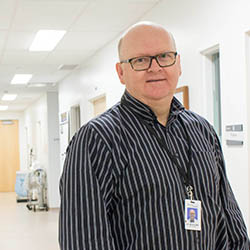Over 100,000 Canadians have Parkinson’s disease, a progressive, degenerative neurological condition often characterized by tremors, difficulty with movement and rigidity of muscles. This number is growing rapidly, as society ages.
We spoke with Martin McKeown, Director of the Pacific Parkinson’s Research Centre and a Professor in the Department of Medicine, about his research, what he hopes to accomplish in the years ahead, and his recent collaboration with Conquer Mobile to create an app for people with Parkinson’s.
Tell us about your background and what sparked your interest in Parkinson’s research.

Dr. Martin McKeown
With a background in engineering, medicine and neurology, I became interested in Parkinson’s research because some early symptoms of the disease, like tremors and stiffness, involve disorders of movement, which can be measured more easily than say subtle changes in cognition.
The Parkinson’s community is also wonderful to work with. They are engaged, enthusiastic and supportive of research, which makes our work very rewarding.
You have a very interesting background in engineering physics, medicine and neurology – How has this influenced your research?
Engineering teaches you to solve problems. This is a valuable skill to have in many fields including medicine, and especially in neurology. But the intellectual cultures of the two fields are very different, which can present challenges when working together.
Many people in medicine come from a biological background, so will typically approach disease from the traditional avenues of anatomy, pathology and biochemistry. With regard to Parkinson’s, there has been great emphasis on how the biochemistry is altered, which has led to the use of hugely successful medications like L-dopa. Initially, no one thought studying the oscillatory aspect of the disease, such as how brain waves are altered, would be useful but this ended up leading to the development of another highly successful treatment – Deep Brain Stimulation.
In order to optimally treat and possibly cure Parkinson’s, we need to use many complementary approaches to gain full understanding of the disease. New imaging technologies such as PET/MRI, which can look at both the biochemistry and the interactions between brain regions simultaneously, will likely greatly enhance our understanding.
You recently collaborated with Conquer Mobile to create an app for people with Parkinson’s disease. Can you tell us more about how the app will help patients?
We are fully aware of the fact that we typically see people with Parkinson’s disease for a brief “snapshot” during their clinical visit, which may be only once per year. This may not be an accurate assessment of how they are doing when in the comfort of their own homes. We are looking at new technologies (such as the app developed with Conquer mobile) where we can assess people’s motor and cognitive performance remotely and longitudinally and relay their information securely back to the clinic.
We are then seeing if we can use specialized algorithms to create an accurate evaluation as to how well people are functioning and whether they are in need of other therapeutic interventions.
What’s next on your professional bucket list?
I would like to see how we can explore new treatments for Parkinson’s disease. In order to determine how successful a therapy is, we also need to look at ways to monitor disease progression. Pharmacotherapy and surgical therapy have been tremendously successful but I think we may have come close to saturation for these approaches.
New techniques, like portable external brain stimulators, biofeedback and other interventions may provide new ways to ensure people with Parkinson’s live long, healthy and productive lives.
Dr. Martin McKeown is the Director of the Pacific Parkinson’s Research Centre and PPRI/UBC Chair in Parkinson’s Research. He is also a Professor in the Department of Medicine, as well as an Adjunct Professor in the Departments of Electrical and Computer Engineering. Dr. McKeown was a member of the Neuroscience A (NSA) Canadian CIHR Scientific peer review committee, as well as a member of the Scientific Advisory Board of the Parkinson’s Society of Canada. He has authored over 100 peer-reviewed papers and book chapters, as well as been responsible for a variety of peer-reviewed research projects funded through the National Institute of Health (US-NIH), the National Parkinson’s Foundation (US-NPF), the Canadian Foundation for Innovation (CFI), the Natural Sciences and Engineering Research Council of Canada (NSERC), the Canadian Institutes of Health Research (CIHR), the International Association of Translational Neuroscience, and the (US) Whitaker Foundation.